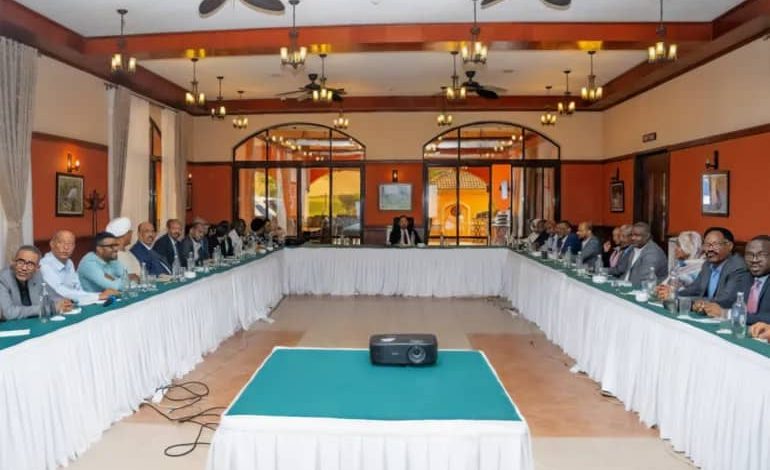Features of the “Sumud” Roadmap to Resolve Sudan’s Crisis

Report by Al-Nour Ahmed Al-Nour
In a new initiative to break the political deadlock in Sudan, the Civil Democratic Coalition of the Forces of the Revolution, known as “Sumud” and led by former Prime Minister Abdalla Hamdok, has proposed a vision to end the war and submitted it to its political rivals. Observers believe the proposal requires substantial amendments and concessions to make a breakthrough in the crisis.
The Democratic Civil Forces Coordination “Taqaddum” dissolved itself on February 10, after internal disputes over forming a parallel government in areas controlled by the Rapid Support Forces (RSF). Consequently, those who opposed forming such a government established the “Sumud” alliance, while other factions and political groups joined the Founding Sudan Coalition “Tasis,” which is preparing to form a parallel government.
The “Sumud” alliance revealed a multi-track political roadmap to end the war. This includes a permanent ceasefire, fundamental reform of military institutions, transitional justice, and a transitional civilian government lasting ten years—five foundational years and five under an elected government.
Contents of the Vision
The initiative—of which Al Jazeera Net obtained a copy—begins with a permanent ceasefire as a first step, followed by a comprehensive peace agreement that not only ends the fighting but also ushers in a new political phase.
The proposal calls for the establishment of a democratic federal civil state based on complete separation between religious affiliation and the state. The state is to maintain equal distance from all religions and beliefs.
The vision also stipulates banning the political activities of the National Congress Party, led by former President Omar al-Bashir, and its affiliates. It prohibits its participation in any governmental institutions or commissions and disallows re-registration of its associations or organizations. All its assets and shares are to be transferred to the Ministry of Finance.
The vision outlines several tracks:
Humanitarian track: Delivery of aid and protection of civilians.
Ceasefire track: Agreement on a permanent ceasefire and security arrangements.
Political track: Launch of a national dialogue to address the roots of the crisis and lay the foundation for sustainable peace.
The roadmap sets the first transitional foundational period at five years, ending with general elections, followed by another five-year transitional phase led by an elected government committed to completing the foundational tasks.
Political Debate
“Sumud” spokesperson Bakri Al-Jack stated in a press briefing that the alliance submitted its vision to several groups: the Democratic Bloc of the Forces of Freedom and Change led by Jaafar al-Mirghani, the original Baath Party, the Popular Congress Party, Mubarak al-Fadil al-Mahdi who leads the National Accord Forces Alliance, and Tijani Sissi of the National Movement Forces Alliance. They requested meetings with these groups to reach consensus on the principles and foundations for ending the war.
Sources within “Sumud” told Al Jazeera Net that they also intend to send a copy of the new vision to the head of the Sovereign Council and army commander, Abdel Fattah al-Burhan.
On the other hand, the Coordination of National Forces, aligned with the army and led by Mohamed Said Ahmed “Al-Jakoumi,” criticized the “Sumud” initiative as a “rehash of general principles and vague slogans, completely lacking any practical and clear mechanisms to stop the war.”
In its statement, the coordination body said that “Sumud’s” silence on taking a clear stance against the rebellion (referring to the RSF) raises doubts about its true intentions and suggests it still bets on the rebellion to reshape the political scene in a way that ensures its return to power.
Political analyst and editor-in-chief of Al-Tayar newspaper, Othman Mirghani, argued that “Sumud’s” vision reads more like a lengthy essay mixing opinion, analysis, and roadmap—with strange contradictions where it proposes an idea only to adopt its opposite.
In an interview with Al Jazeera Net, he criticized the proposal of two transitional phases totaling ten years, noting that the country would reach 80 years of transitional governance since its independence. He added that transitional structures ending in elections, followed by an elected government bound to decisions made during a previous unelected period, lack electoral legitimacy.
To achieve consensus, Mirghani believes the vision requires substantial amendments based on national security imperatives rather than political advantages.
He emphasized that recognizing the army as the legitimate force protecting the country, without challenge, is a critical step for building a unified political platform.
Dialogue, Not a Solution
Omar al-Degeir, head of the political mechanism within “Sumud” and leader of the Sudanese Congress Party, defended the peace vision as a call for open dialogue on pathways out of the crisis and rebuilding the state.
In a Facebook post, Al-Degeir stated: “The vision is not a sacred text or an imposed project; it is a serious invitation for collective thinking and constructive engagement to unify national will toward ending the war, achieving peace, and agreeing on the requirements of sound national rebuilding.”
He added, “Overcoming the current disaster is not impossible. Sudanese people can turn their crisis into a launchpad for a long-awaited renaissance, if their unified will prevails over their destructive fragmentation.”
Political analyst Mohamed Alaa Al-Din believes that “Sumud’s” vision presents a political dialogue agenda rather than an actual solution. He notes that the alliance made unprecedented concessions by submitting its vision to pro-army political blocs and inviting them to dialogue, despite previously refusing to sit with them—signaling a shift in their position.
Al-Din told Al Jazeera Net that “Sumud” blames Islamists for the war and their influence over military decision-making, while simultaneously calling for a ban on al-Bashir’s party. This contradiction undermines the call for inclusive dialogue, as real dialogue must involve adversaries, not just allies. Making a breakthrough requires mutual, even painful, concessions.
Source: Al Jazeera



